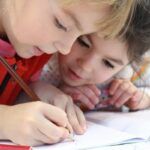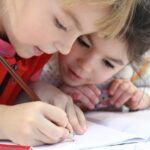Since the Covid-19 virus started spreading, European citizens, like other people around the globe, have been put to the test in all aspects of life – health and well-being, livelihood and occupations, family ties and social relationships. While some countries are now starting the gradual lifting of confinement restrictions, life as we knew it before remains largely on hold for the time being. Schools, day care centres and universities are still heavily affected, and will be re-opening only very gradually over the coming weeks and months.
Alternative teaching practices
With schools closed across Europe, teachers have had to develop alternative teaching practices often with very limited training in distance education. They have frequently been doing this in addition to responding to the needs of their own families and children. Parents of school-aged children, on the other hand, have suddenly had to balance their work or telework arrangements with efforts to support their children’s home schooling activities.
In the best cases, teachers have managed to cooperate with colleagues and parents to ensure the continuity of their students’ learning and development. However, some teachers struggle with IT, with keeping up their students’ motivation and engagement levels, or with assessing achievement and progress.
Some European governments have taken immediate steps to ensure support to the most disadvantaged families. In Spain, a recently adopted law stipulates that families with children receiving school meals are entitled to financial aid or the direct provision of food during school closures. The Dutch government allocated 2.5 million euros to buy laptops for students in general and vocational education who lack proper equipment at home. In Portugal, a national TV channel is broadcasting classes in several subjects for all compulsory school age students, targeting in particular those without any access to the internet and/or computers. Specific guidance issued by the Department for Education and Skills in Ireland provides concrete advice and resources for schools and teachers to support students in primary and post-primary settings who are at risk of educational disadvantage.
As a result of the current situation, some teachers have also been reporting unexpected improvements in some of their students’ school work.
The pandemic has also highlighted the critical role played by parents in supporting students’ learning and development. Establishing clear communication between schools and parents, with simple guidelines on learning objectives and outcomes has been critical in ensuring that parents can help their children without anyone feeling overburdened.
As schools gradually re-open the health and safety of students and all school staff is paramount, and a number of basic principles need to be applied to help stop the spread of the virus. Consultation, communication and coordination to reassure parents of the safety of schools and to maintain their support for educational activities will remain crucial. Health needs must also include mental health and well-being, which will continue to pose challenges for students and staff alike beyond the period of confinement. Surveys of teachers during the current pandemic show that many are experiencing heightened levels of stress and anxiety related to school closures, online learning and the uncertainties surrounding the return to school. These feelings may increase as schools reopen.






Leave a Reply